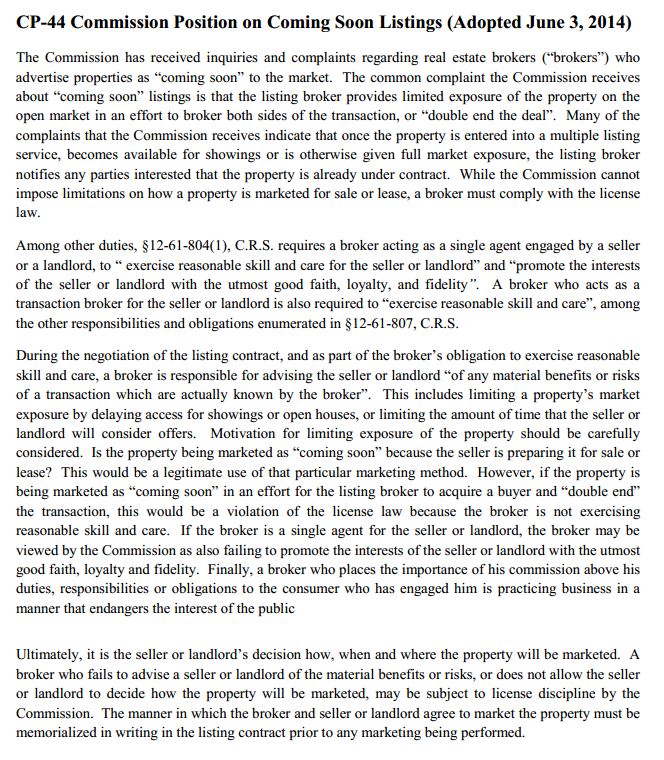I was recently part of a discussion where an appraiser asked the group:
I am an appraiser as well as a real estate sales agent. After I complete inspecting a property for an appraisal assignment and before leaving the property, can I then solicit the owner about the prospect of being his listing agent or buying agent if he needs one in the future? I have no current interest in the house being appraised. Would this action violate USPAP?
Remember that determining compliance or non-compliance with USPAP would ultimately be determined by your state regulator. Certain states may have position statements, guidelines, or specific instructions on how to handle yourself in these types of dual-license situations. That being said, let me discuss with you several important passages from USPAP which relate to an appraiser soliciting his or her sales services to a homeowner during the appraisal visit.
To start, the Conduct section of the Ethics Rule states that an appraiser “must not misrepresent his or her role when providing valuation services that are outside of appraisal practice”. Part of understanding whether we are “misrepresenting” our role is to consider our interactions from the point of view of the parties involved, in this case the homeowner. In your case, you are clearly performing services as an appraiser, since the homeowner was told an appraiser would visit the property, an appraiser’s office called to set the appointment for the appraisal visit, an appraiser arrived to measure and photograph the house as an appraiser, and so on. If, while you are perceived to be an appraiser, you solicit business related to sales services and later list the house for sale, might the homeowner think you are listing her house as an appraiser? After all, you solicited the homeowner when acting as an appraiser and the homeowner knows you by your appraisal work.
Soliciting for a listing while performing the appraisal as an appraiser can mislead a homeowner in terms of his or her understanding of what service you are providing now and what service you might provide in the future. The Management section of the Ethics Rule states “An appraiser must not advertise for or solicit assignments in a manner that is false, misleading, or exaggerated.”
Keep in mind, too, that the Conduct section of the Ethics Rule states “an appraiser must perform assignments with impartiality, objectivity, and independence, and without accommodation of personal interests.” Offering sales services as you described may cast doubt on whether you are truly acting impartially and without accommodating your personal interests.
Further, and perhaps most to the point, your act of soliciting or promoting your services as a listing or sales agent creates a prospective interest in the property or parties. To illustrate, ask yourself: Why are you advertising your sales services to her? Invariably, your intent is to obtain the listing and/or sell a house to her in the future – a prospective interest.
If you have an interest, USPAP then requires two disclosures for appraisal and appraisal review assignments. The Conduct section of the Ethics Rule requires: “If known prior to accepting an assignment, and/or if discovered at any time during the assignment, an appraiser must disclose to the client, and in each subsequent report certification: any current or prospective interest in the subject property or parties involved”. The initial disclosure to your client might take the form of a phone call or email, and the disclosure in the report certification should follow the example of Standards Rule 2-3. (Note that if you are performing appraisal practice that does not result in an appraisal report or appraisal review report, the initial disclosure to your client is still required.)
But disclosure aside, while USPAP allows the appraiser to have an interest in the property and parties, many intended uses prohibit the appraiser from performing the assignment if he or she has any interest. For example, the I.R.S., the GSEs, and federal financial institution regulators have regulations speaking to the appraiser’s interest related to the property or parties. So, while USPAP allows it, you would likely need to decline or withdraw from the assignment if you have a current or prospective interest.
In the scenario in question: by soliciting sales services, you are creating a prospective interest which must be disclosed and likely precludes you from performing the assignment.
To restate the oft-cited “hat” metaphor: bring only and wear only your “appraiser hat” for your appraisal assignments.
Joshua Walitt, SRA, AI-RRS, MNAA, CDEI is a certified residential real estate appraiser, reviewer, and educator. As the Compliance Manager for Property Interlink, he oversees procedures, training, licensing, audit, operations, and review functions. His ongoing goal is to increase accuracy and efficiency through sound reasoning and communication skills, appropriate methodology and technology, and proper oversight.He writes for industry publications, speaks at national industry events and client conferences, and designs and presents education courses. Prior to joining Property Interlink, he provided fee appraisal and consultation services. He has also been recognized as an expert witness in local and federal court.
Walitt holds the SRA & AI-RRS designations with the Appraisal Institute, is a Board Member of the National Association of Appraisers (MNAA), holds a Certified Distance Education Instructor (CDEI) certificate, is an AQB Certified USPAP Instructor, and currently serves on the Colorado Board of Real Estate Appraisers.


